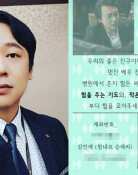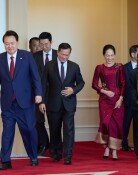China and Japan Engage in Verbal War over International Manner
China and Japan Engage in Verbal War over International Manner
Posted May. 25, 2005 03:34,
China-Japan relations are once again rapidly freezing.
The latest round occurred when Chinese Vice Premier Wu Yi unilaterally cancelled her conference with Japanese Prime Minister Junichiro Koizumi on May 23.
It is expected that the two countries will not be able to compromise for some time because Japan is criticizing Chinas diplomatic insolence everyday, while China is blaming Japan by raising the subject of Japanese Prime Minister Koizumis stand on the Yasukuni Shrine pilgrimage issue.
Japan Criticizes Chinas Action as International Mannerlessness-
Japanese Foreign Minister Nobutaka Machimura harshly denounced China on May 23 afternoon, saying, Canceling the conference at the last minute without manifesting a reason is comparable to the recent destructive acts committed by Chinese vagrant protestors against the Japanese Embassy in China.
Secretary-general Tsutomu Takebe of the Japans ruling Liberal Democratic Party (LDP) also condemned China, saying, It is unimaginable in view of international etiquette that [China] returned its representative for no reason.
Concerning the issue, the Sankei Shimbun criticized, Back in 1998, former Russian President Boris Yeltsin canceled a summit meeting with former Prime Minister Ryutaro Hashimoto, but considering that Chinese Vice Premier Wu Yi is in subordinate position comparing to Japanese Prime Minister Koizumi, it is much more insulting.
China: Japan Broke Faith First-
Chinese Assistant Foreign Minister Shen Guofang explained the reason for canceling the conference yesterday, saying, It was extremely inappropriate that Japanese leaders discussed the subject of making pilgrimages to the Yasukuni Shrine during Vice Premier Wu Yis visit to Japan.
Quoting Chinese sources, Kyodo News reported yesterday that Vice Premier Wu suggested canceling the meeting with Koizumi to her superiors, and that they accepted the idea.
In response to Prime Minister Koizumis remark before the assembly that it is none of other countries business to meddle with how [we] treat our war dead, Vice Premier Wu asked her government to reject the meeting with Koizumi, saying that she would not be able to tolerate listening to those same words in the meeting, and she received an answer of consent from the Chinese leadership on the evening of May 22.
There was also another factor to this event. LDP Secretary-general Tsutomu Takebe said that China was interfering with Japans domestic affairs by raising the Yasukuni Shrine issue during his meeting with Minister of the International Department Wang Jiarui of the CCP, who rejected the accusation outright.
Overall, Chinas response to Japans outrage over the cancellation of the meeting with Koizumi is that Japan broke the faith the two countries reached to agree to join hands in rebuilding the bilateral relationship between China and Japan when Chinese President Hu Jintao and Prime Minister Koizumi met at a summit in Jakarta, Indonesia on April 23.
War of Nerves Expected to Continue for a While-
Hong Kong-based news commentator Liu Yue-shao forecasted: China-Japan relations are expected to experience a frozen period for a while as the two not only face the problem of history but also the dominium conflict surrounding the Diaoyu Islands and the race to grasp the regional initiative as Japan is making moves to advance to permanent membership in the U.N. Security Council.
As President Hu Jintao secured an advantageous position in the Taiwan issue due to the Taiwanese opposition party leaders recent visit to China, he explained that China would also maintain an aggressive stance regarding Japan relations for a while.
Yoo-Seong Hwang Hun-Joo Cho yshwang@donga.com hanscho@donga.com






